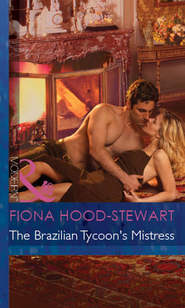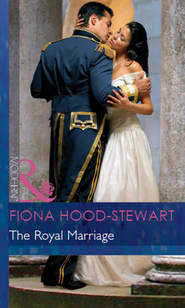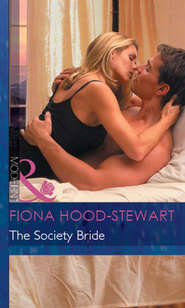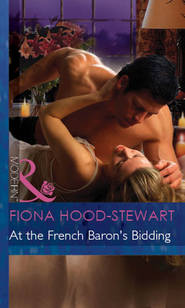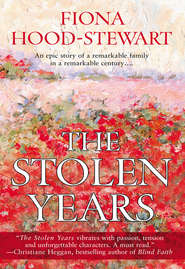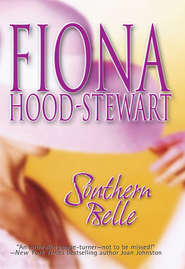По всем вопросам обращайтесь на: info@litportal.ru
(©) 2003-2024.
✖
The Lost Dreams
Автор
Год написания книги
2018
Настройки чтения
Размер шрифта
Высота строк
Поля
The acrid scent of burning food made her swivel toward the oven, the shepherd’s pie that she’d forgotten a sharp reminder of just how absentminded and unorganized she could be. Sylvia, she reflected somberly, probably never did silly things like leave the oven on. Then, hoisting a slender hip up onto the counter, she grinned as she imagined Sylvia’s apartment; probably somewhere in the upper east sixties, the perfect address, très slick, Italian furniture—modern, of course—a very clean, minimalist look, all ecru and beige with touches of chrome. Not a thing out of place.
A crack of laughter broke the silence as she slipped on a pair of charred oven gloves, opened the oven door and pictured Brad and the twins in this hypothetical home. She grimaced at the burned crust, glanced despondently at the oven’s too-high setting and pulled herself up guiltily. She had no business criticizing Sylvia, who from all accounts was delightful and who adored Rick and Todd, Brad’s half brothers whom he’d taken in eight years ago when their parents died tragically in a plane crash. What right had she to judge someone who, according to general opinion, was the perfect wife for him?
Charlotte gazed down at the pie, burned to a crisp, whose destination was the rubbish bin. She decided to give her mother a thank-you call before she went to bed, although she wouldn’t mention the burning bit. Mummy was a brick. It was so decent of her to have finished the cleanup, which she’d been dreading returning to.
Dumping the pie temporarily in the sink, she took her tea to the old wooden table and sat down on one of the rickety wooden chairs with a thud, the day’s emotions and the long drive finally catching up with her. She jiggled the stool warily. Perhaps Mummy was right and she should invest in some new furniture on the next trip into Glasgow. But she hated crowds and shops and people and decisions—even minor ones such as choosing chairs or curtains seemed insurmountable right now. And that went for clothes too, an issue her mother brought up constantly. Why she should care what she looked like here on Skye was beyond her. After all, there were only the sheep and now Armand de la Vallière to see her—and Armand, though very fashion-conscious, was gay, so he didn’t really count.
Her mind wandered back to Brad wondering how he truly felt about inheriting Strathaird. She swung her foot absently, remembering their talks of old. It had been a while since they’d sat down for a long cozy chat. God knows, in the dark bleak days when she and John leaped from one argument into another, knowing he was a phone call away had been a lifesaver. But since the accident, their conversations had somehow fizzled out. She had felt guilty talking to him for so long and so often without a specific reason. Before John’s injury, there had always been a motive. She’d poured out some of her pain. And although she’d rarely taken his advice, it had helped. But since the accident, any talk had been businesslike and to the point. Oh well, Charlotte sighed, it was probably best. They each had their lives to live.
She rose briskly and brushed her hair away from her face, considering whether Brad fully realized all that inheriting Strathaird implied—the people, the everyday worries, the plans and intricacies? Or did he think he could run it like he ran Harcourts, the multimillion-dollar porcelain and upscale decorating enterprise he’d inherited from his grandfather? She refilled her cup, sipped absently. “Hell’s bells,” she swore crossly when she burned her tongue and the tea spilled, dirtying her T-shirt. This was definitely not her day, she reflected grimly, closing her eyes and taking a deep breath. And why was she so concerned about Brad, when she had more than enough on her own plate? Ridiculous! Brad was a big boy. He knew the place well, had been coming here since he was a child and could very well take care of himself. There was no reason for her to worry. Or was there? It was one thing to pop over for short visits to see his grandparents, flying in on a chopper, then wafting out again. But this was a different kettle of fish altogether, and she doubted whether even the eternally well-prepared Brad had the slightest inkling of all that would be expected of him as laird.
A meow from the windowsill brought her out of her reverie. Hermione sat curled on the outside ledge, preening her whiskers and cleaning her soft tabby fur. Charlotte rose, opened the window and allowed the cat to pad daintily over the sink toward her basket by the stove. As she reached to close the window, a sudden movement caught her eye. She frowned, wondering if a sheep had wandered in from the fields. All at once she shivered, then pulled herself together, deciding she was even more tired than she’d realized. This was Skye, and there was no danger here. She turned and thoughtfully eyed the cat.
“Where have you been?” she inquired, picking her up and stroking gently. “I’m glad to see you know your new way home. How do you like it?” She was reassured by a satisfied purr. “Good,” she murmured, letting the animal slip from her arms. “At least one of us is happy.”
She was about to leave the kitchen when the sound of a muted cough made her stand stock-still. There was definitely someone out there.
Warily Charlotte slipped into the hall, opened the antique chest on the floor and picked out a cricket bat. Just as stealthily, she opened the front door. As she emerged, a shadow flitted near the gate.
“Stop,” she called, rushing forward, wielding the bat wildly. A figure stumbled through the gate and she hurled herself toward it.
“Dinna’ hit me, Miss Charlotte, dinna’, please.”
The pleading voice of Bobby Hewitt made her drop her arms in sudden relief.
“Bobby! What on earth are you doing here?” she exclaimed, limp with irritation and relief. “You gave me the most awful fright.”
“I wasna’ doing anything wrong.”
“But what are you doing out here? It’s past ten o’clock.” She glanced at the bowed figure. Poor Bobby was a simple, harmless soul in his mid-forties who’d been trailing her adoringly since she was a child. But he had never snooped around at night. Of course, she realized with a frown, she’d always been ensconced in the castle. Now, on her own at Rose Cottage, things were different.
“Come here,” she said, taking him by the arm of his worn jacket and making him stand under the porch light. “Bobby, you can’t wander around at night spying on people.”
“I wasna’,” he remarked, his mouth taking on a stubborn twist. “I was making sure everything was all right. There’s strangers about.”
“They’re called tourists, Bobby.” Her face broke into a smile and she shook her head. “So you thought to guard the cottage? Don’t worry about me, Bobby, everything’s fine. There are no marauders around here. You know that.”
“Ye canna’ be too careful.”
“No, of course not. Still, you mustn’t come scaring me like that. I almost went after you with Colin’s cricket bat.” She swung it over her shoulder. “Now get back to your mother’s cottage and no more roaming around here after dark, promise?”
“Aye.” He nodded penitently, seeking forgiveness.
Charlotte smiled at him. “If you wait two seconds, I’ll get you some of Mrs. McTavish’s toffees. You like those, don’t you?”
He nodded in eager response, like a small child.
Charlotte sighed, propped the bat against the hall wall and went back to the kitchen where she found a bag of toffees. Perhaps something should be done to help Bobby, although he seemed perfectly content.
“Here you are. Now off you go, straight home, and don’t let this happen again.”
“Aye. Thanks, Miss Charlotte. I’m sorry I scared ye. I didna’ mean any harm.”
“I know. Now run along.”
She watched as he hurried off, his shoulders slightly stooped, long hair trailing thinly on his shoulders. Poor Bobby. She should have realized he might get up to something like this, but frankly, Bobby Hewitt was the last person on her mind right now.
She locked up and glanced at the heavy gold watch on her wrist. Gosh, it was late. Better give her mother a buzz, then get to bed.
The library fire dwindled, embers stuttered, coals shifted and Armand de la Vallière sighed. It was his favorite room in the castle.
He sat in solitary contemplation, surrounded by leather-bound books, heavy mahogany furniture and the ancient French-damask curtains installed so many years ago by Tante Hortense, a balm to his strained nerves. He peered through the mullioned windows into the inky summer evening, vaguely aware of Penelope’s voice echoing through the Great Hall. Concentrating, he leaned forward, staring once more at the packed shelves of books, eyes narrowing. It would be a difficult search, one that would require all his ability. The sheer physical impediment of having to climb up to the highest shelves made it almost impossible to take a good look at the books without attracting suspicion. He stared into the dying flames, obliterating the haunting images that lurked in his memory since childhood, replacing them instead with shining scenes of glitz, glamour and glory. It was a technique he’d perfected over the years, and infallibly it worked.
Now, as fleeting shadows played on the spines of the ancient book covers and the darkened walls, he replaced the packed shelves with visions of splendid jewels. They shimmered in his imagination, and he sighed. The method acted as effectively as any hallucinogen. Slowly his tense muscles relaxed and he breathed easier, entranced, visualizing the catwalk, the agitated buzz, models preparing to strut the runway, hairdressers, makeup artists and seamstresses, all waiting for his final orders. His fingers unclenched as he pictured himself directing operations, adding the finishing touches with a master’s skill. Finally he would place each of Charlotte’s exquisite pieces at precisely the right angle before sending the model forth, waiting with bated breath for the murmured hush of the crowd.
A frisson of satisfaction left him sighing. Nothing less than perfection would do. And he had seen perfection in Charlotte’s work. He drew a cigarette from an antique silver cigarette case, tapped it thoughtfully on the arm of the old leather chair, then lit it. To have such amazing talent, yet be so oblivious. A quivering pang of envy darted straight to his heart. Why was life so unfair? Why did some have all the suffering, the toil, the trouble, while others glided unwittingly into fame and fortune? Indeed, why did life bestow talent on those who didn’t give a damn, while denying it to those for whom it meant the world?
He took a long drag and leaned back in the deep armchair, aware there was little to be gained from such thoughts. It was too late to acquire that which God had not given him.
Still, he decided with a grim little smile, it might not be too late to redirect fate into avenues more suited to his liking. After all, there was a reason for his presence here, at this specific time.
Once more he inhaled deeply, then let the smoke curl up toward the coffered oak ceiling and shut his eyes. He was so close. So very close. And nothing would convince him otherwise.
2
Brad studied the preliminary agenda for next month’s board meeting and added a few margin notes, increasing the time allotted to discuss international expansion. Harcourts may have begun as a porcelain empire almost a century ago, but over the decades, particularly since Brad had been CEO, the business had expanded to include all aspects of upscale home décor. International growth was essential and needed special attention. World markets were growing fast and he planned to be there on the crest of the wave.
Capping his pen, he tossed it on the desk, loosened the silk tie that was suffocating him and allowed himself a moment of self-congratulation. The last quarter’s profits had surpassed everyone’s expectations. The company was leaner and more productive than any in the industry, and the innovative publicity campaigns Sylvia had engineered for the new designer dinnerware lines had taken the public by storm; sales had doubled in several markets and Harcourts was on a roll.
And now he was obliged to carve two weeks out of the hectic and tense period before the annual directors’ meeting to go to Scotland. It wasn’t going to be easy, Brad realized, drumming his foot while studying the schedule his secretary had laid on the desk this morning. He wondered briefly if there was any way of avoiding it, knowing very well he could not put off the trip to Strathaird. Based on the teleconference with the solicitors in Edinburgh, it was clear his presence was required to settle the labyrinthine legal issues related to the estate, and he owed it to Aunt Penn and Charlotte to deal with matters as quickly and cleanly as he could. He thought of what he’d discussed with Sylvia the previous evening. It was true that he wanted to go. And of course the idea of seeing the family again, spending time in a place he’d always enjoyed, had its attractions. It was just such a damn inconvenient moment.
He leaned back and swiveled the ample leather office chair, picturing the rugged fortress, battered by centuries of wind and rain, relentless waves and enemy onslaught. Lately it seemed to be beckoning him.
Learning he was a part of Strathaird’s heritage had come as a shock. Discovering he had become its owner was sobering. But he’d accepted the inevitable, and now there was nothing to do but assume his duties as laird and invest what little time his busy life permitted to try and do the job right. Although he knew the place well, had climbed its rocks and walked its shores and moors since early childhood, he’d never considered himself more than a guest in his grandparents’ home.
He glanced once more at the schedule, wondered if perhaps two weeks would be too little and whether it could be stretched into three. His gut told him he’d need the time. Penelope expected it of him, Charlotte probably expected it of him as well, and apparently the tenants did, too. That, he sighed, had been made abundantly clear, both in his meetings and by his aunt. Not directly, he realized, smiling at how subtle the British could be. Nothing was ever said head-on, just implied.
He rose and moved across the large office to the window and stared at the Manhattan skyline. But instead of Rockefeller Center and the Empire State Building, a riot of titian hair and violet eyes flashed before him. He pulled himself up with a jolt and glanced guiltily at his watch, remembering he was due to meet Sylvia in an hour at Julio Larraz’s private art showing. Focusing on the subject of art he thought of the several Larraz paintings and two bronze sculptures he’d already acquired. He’d missed the exhibition in Monte Carlo and was damned if he’d wait for another auction at Christie’s or Sotheby’s to acquire another piece. Turning on his heel, he pressed a button on the chrome phone panel and punched.
“Yes, sir?” Ramon answered promptly.
“I’ll be down in ten,” he said, glancing again at his watch.
“Very good, sir.”
A perfunctory knock was followed by the door opening. Marcia, his secretary, entered with her usual brisk step. “I’ve made a couple of changes to the schedule,” he remarked, handing it to her while answering his cell phone. He sent her an apologetic smile while she stood patiently, with the air of one used to waiting. She gasped as she glanced at the changes.
“Right,” Brad spoke into the phone. “Start buying as soon as the market opens, but not so much stock that anyone’ll notice. Yeah…I learned today they’ve got a merger going.” There was a pause as he listened. “Sure thing. Good night.”






